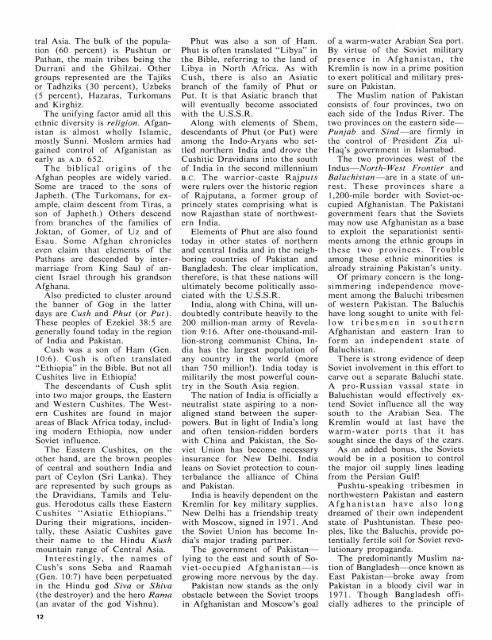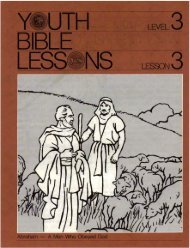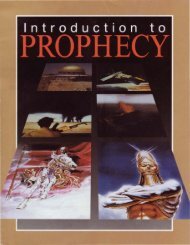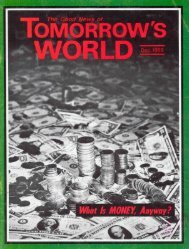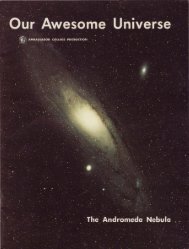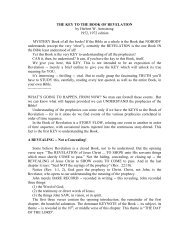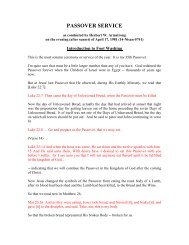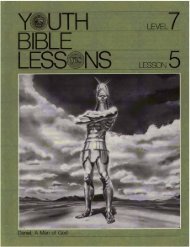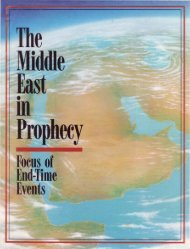Why Russia Will Not Attack America - Church of God - NEO
Why Russia Will Not Attack America - Church of God - NEO
Why Russia Will Not Attack America - Church of God - NEO
- No tags were found...
You also want an ePaper? Increase the reach of your titles
YUMPU automatically turns print PDFs into web optimized ePapers that Google loves.
tral Asia. The bulk <strong>of</strong> the population(60 percent) is Pushtun orPathan, the main tribes being theDurrani and the Ghilzai. Othergroups represented are the Tajiksor Tadhziks (30 percent), Uzbeks(5 percent), Hazaras, Turkomansand Kirghiz.The unifying factor amid all thisethnic diversity is religion. Afganistanis almost wholly Islamic,mostly Sunni. Moslem armies hadgained control <strong>of</strong> Afganistan asearly as A.D. 652.The biblical origins <strong>of</strong> theAfghan peoples are widely varied.Some are traced to the sons <strong>of</strong>Japheth. (The Turkomans, for example,claim descent from Tiras, ason <strong>of</strong> Japheth.) Others descendfrom branches <strong>of</strong> the families <strong>of</strong>Joktan, <strong>of</strong> Gomer, <strong>of</strong> Uz and <strong>of</strong>Esau. Some Afghan chronicleseven claim that elements <strong>of</strong> thePathans are descended by intermarriagefrom King Saul <strong>of</strong> ancientIsrael through his grandsonAfghana.Also predicted to cluster aroundthe banner <strong>of</strong> Gog in the latterdays are Cush and Phut (or Put).These peoples <strong>of</strong> Ezekiel 38:5 aregenerally found today in the region<strong>of</strong> India and Pakistan.Cush was a son <strong>of</strong> Ham (Gen.10:6). Cush is <strong>of</strong>ten translated"Ethiopia" in the Bible. But not allCushites live in Ethiopia!The descendants <strong>of</strong> Cush splitinto two major groups, the Easternand Western Cushites. The WesternCushites are found in majorareas <strong>of</strong> Black Africa today, includingmodern Ethiopia, now underSoviet influence.The Eastern Cushites, on theother hand, are the brown peoples<strong>of</strong> central and southern India andpart <strong>of</strong> Ceylon (Sri Lanka). Theyare represented by such groups asthe Dravidians, Tamils and Tehtgus.Herodotus calls these EasternCushites "Asiatic Ethiopians."During their migrations, incidentally,these Asiatic Cushites gavetheir name to the Hindu Kushmountain range <strong>of</strong> Central Asia.Interestingly, the names <strong>of</strong>Cush's sons Seba and Raamah(Gen. 10:7) have been perpetuatedin the Hindu god Siva or Shiva(the destroyer) and the hero Rama(an avatar <strong>of</strong> the god Vishnu).12Phut was also a son <strong>of</strong> Ham.Phut is <strong>of</strong>ten translated "Libya" inthe Bible, referring to the land <strong>of</strong>Libya in North Africa. As withCush, there is also an Asiaticbranch <strong>of</strong> the family <strong>of</strong> Phut orPut. It is that Asiatic branch thatwill eventually become associatedwith the U.S.S.R.Along with elements <strong>of</strong> Shem,descendants <strong>of</strong> Phut (or Put) wereamong the Indo-Aryans who settlednorthern India and drove theCushitic Dravidians into the south<strong>of</strong> India in the second millenniumB.C. The warrior-caste Rajputswere rulers over the historic region<strong>of</strong> Rajputana, a former group <strong>of</strong>princely states comprising what isnow Rajasthan state <strong>of</strong> northwesternIndia.Elements <strong>of</strong> Phut are also foundtoday in other states <strong>of</strong> northernand central India and in the neighboringcountries <strong>of</strong> Pakistan andBangladesh. The clear implication,therefore, is that these nations willultimately become politically associatedwith the U.S.S.R.India, along with China, will undoubtedlycontribute heavily to the200 million-man army <strong>of</strong> Revelation9: 16. After one-thousand-million-strongcommunist China, Indiahas the largest population <strong>of</strong>any country in the world (morethan 750 million!). India today ismilitarily the most powerful countryin the South Asia region.The nation <strong>of</strong> India is <strong>of</strong>ficially aneutralist state aspiring .to a nonalignedstand between the superpowers.But in light <strong>of</strong> India's longand <strong>of</strong>ten tension-ridden borderswith China and Pakistan, the SovietUnion has become necessaryinsurance for New Delhi. Indialeans on Soviet protection to counterbalancethe alliance <strong>of</strong> Chinaand Pakistan.India is heavily dependent on theKremlin for key military supplies.New Delhi has a friendship treatywith Moscow, signed in 1971. Andthe Soviet Union has become India'smajor trading partner.The government <strong>of</strong> Pakistanlyingto the east and south <strong>of</strong> Soviet-occupiedAfghanistan isgrowing more nervous by the day.Pakistan now stands as the onlyobstacle between the Soviet troopsin Afghanistan and Moscow's goal<strong>of</strong> a warm-water Arabian Sea port.By virtue <strong>of</strong> the Soviet militarypresence in Afghanistan, theKremlin is now in a prime positionto exert political and military pressureon Pakistan.The Muslim nation <strong>of</strong> Pakistanconsists <strong>of</strong> four provinces, two oneach side <strong>of</strong> the Indus River. Thetwo provinces on the eastern sidePunjab and Sind are firmly inthe control <strong>of</strong> President Zia ulHaq's government in Islamabad.The two provinces west <strong>of</strong> theIndus North-West Frontier andBaluchistan are in a state <strong>of</strong> unrest.These provinces share a1,200-mile border with Soviet-occupiedAfghanistan. The Pakistanigovernment fears that the Sovietsmay now use Afghanistan as a baseto exploit the separationist sentimentsamong the ethnic groups inthese two provinces. Troubleamong these ethnic minorities isalready straining Pakistan's unity.Of primary concern is the longsimmeringindependence movementamong the Baluchi tribesmen<strong>of</strong> western Pakistan. The Baluchishave long sought to unite with fellowtribesmen in southernAfghanistan and eastern Iran t<strong>of</strong>orm an independent state <strong>of</strong>Baluchistan.There is strong evidence <strong>of</strong> deepSoviet involvement in this effort tocarve out a separate Baluchi state.A pro-<strong>Russia</strong>n vassal state inBaluchistan would effectively extendSoviet influence all the waysouth to the Arabian Sea. TheKremlin would at last have thewarm-water ports that it hassought since the days <strong>of</strong> the czars.As an added bonus, the Sovietswould be in a position to controlthe major oil supply lines leadingfrom the Persian Gulf!Pushtu-speaking tribesmen innorthwestern Pakistan and easternAfghanistan have also longdreamed <strong>of</strong> their own independentstate <strong>of</strong> Pushtunistan. These peoples,like the Baluchis, provide potentiallyfertile soil for Soviet revolutionarypropaganda.The predominantly Muslim nation<strong>of</strong> Bangladesh once known asEast Pakistan broke away fromPakistan in a bloody civil war in1971. Though Bangladesh <strong>of</strong>ficiallyadheres to the principle <strong>of</strong>


